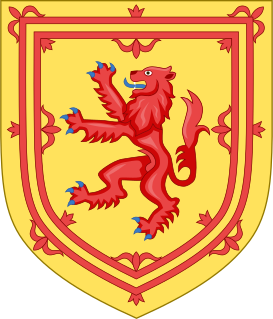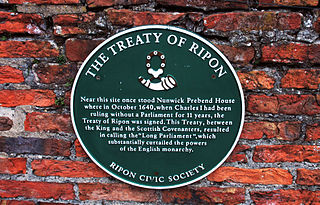
The Scottish Parliament is the devolved, unicameral legislature of Scotland. Located in the Holyrood area of the capital city, Edinburgh, it is frequently referred to by the metonym Holyrood. The Parliament is a democratically elected body comprising 129 members known as Members of the Scottish Parliament (MSPs), elected for five-year terms under the additional member system: 73 MSPs represent individual geographical constituencies elected by the plurality (first-past-the-post) system, while a further 56 are returned as list members from eight additional member regions. Each region elects seven party-list MSPs. Each region elects 15 to 17 MSPs in total. The most recent general election to the Parliament was held on 6 May 2021, with the Scottish National Party winning a plurality.

The West Lothian question, also known as the English question, is a political issue in the United Kingdom. It concerns the question of whether MPs from Northern Ireland, Scotland and Wales who sit in the House of Commons should be able to vote on matters that affect only England, while MPs from England are unable to vote on matters that have been devolved to the Northern Ireland Assembly, the Scottish Parliament and the Senedd. The term West Lothian question was coined by Enoch Powell MP in 1977 after Tam Dalyell, the Labour MP for the Scottish constituency of West Lothian, raised the matter repeatedly in House of Commons debates on devolution.

Scottish independence is the political movement for Scotland to become a sovereign state, independent from the United Kingdom.

John MacDonald MacCormick was a Scottish lawyer, Scottish nationalist politician and advocate of Home Rule in Scotland.

The Scottish Assembly was a proposed legislature for Scotland that would have devolved a set list of powers from the Parliament of the United Kingdom. The Labour Government led the Scotland Act 1978 through Westminster which provided for the establishment of the Scottish Assembly.

The Scottish referendum of 1979 was a post-legislative referendum to decide whether there was a sufficient support for a Scottish Assembly proposed in the Scotland Act 1978 among the Scottish electorate. This was an act to create a devolved deliberative assembly for Scotland. An amendment to the Act stipulated that it would be repealed if less than 40% of the total electorate voted "Yes" in the referendum. The result was that 51.6% supported the proposal, but with a turnout of 64%, which represented only 32.9% of the registered electorate. The Act was subsequently repealed. A second referendum to create a devolved legislature in Scotland was held in 1997 under a newly elected Labour government, which led to the enactment of the Scotland Act 1998 and the creation of a devolved Scottish Parliament in 1999.

The Treaty of Ripon was an agreement signed by Charles I, King of England, Scotland, and Ireland, and the Scottish Covenanters on 28 October 1640, in the aftermath of the Second Bishops' War.

Scottish national identity is a term referring to the sense of national identity, as embodied in the shared and characteristic culture, languages and traditions, of the Scottish people.

Unionism in Scotland is a political movement which favours the continuation of the political union between Scotland and the other countries of the United Kingdom, and hence is opposed to Scottish independence. Scotland is one of four countries of the United Kingdom which has its own devolved government and Scottish Parliament, as well as representation in the UK Parliament. There are many strands of political Unionism in Scotland, some of which have ties to Unionism and Loyalism in Northern Ireland. The two main political parties in the UK — the Conservatives and Labour — both support Scotland remaining part of the UK.

Alexander Henderson was a Scottish theologian, and an important ecclesiastical statesman of his period. He is considered the second founder of the Reformed Church in Scotland. He was one of the most eminent ministers of the Church of Scotland in the most important period of her history, namely, previous to the middle of the seventeenth century.

The Westminster Assembly of Divines was a council of divines (theologians) and members of the English Parliament appointed from 1643 to 1653 to restructure the Church of England. Several Scots also attended, and the Assembly's work was adopted by the Church of Scotland. As many as 121 ministers were called to the Assembly, with nineteen others added later to replace those who did not attend or could no longer attend. It produced a new Form of Church Government, a Confession of Faith or statement of belief, two catechisms or manuals for religious instruction, and a liturgical manual, the Directory for Public Worship, for the Churches of England and Scotland. The Confession and catechisms were adopted as doctrinal standards in the Church of Scotland and other Presbyterian churches, where they remain normative. Amended versions of the Confession were also adopted in Congregational and Baptist churches in England and New England in the seventeenth and eighteenth centuries. The Confession became influential throughout the English-speaking world, but especially in American Protestant theology.
A Cornish Assembly is a proposed devolved law-making assembly for Cornwall along the lines of the Scottish Parliament, the Senedd and the Northern Ireland Assembly in the United Kingdom.

Welsh independence is the political movement advocating for Wales to become a sovereign state, independent from the United Kingdom.

A Claim of Right for Scotland was a document crafted by the Campaign for a Scottish Assembly in 1988, declaring the sovereignty of the Scottish people. It was signed by all then-serving Labour and Liberal Democrat MPs, with the exception of Tam Dalyell (Labour), a strident opponent of devolution. The list of signatories included several MPs who would later attain high office, including future prime minister Gordon Brown, future chancellor Alistair Darling, and future leaders of the Liberal Democrats Charles Kennedy and Menzies Campbell.

The decision of the Parliament of Scotland to ratify the Treaty of Union in 1707 was not unanimous and, from that time, individuals and organisations have advocated the reinstatement of a Scottish Parliament. Some have argued for devolution – a Scottish Parliament within the United Kingdom – while others have advocated complete independence. The people of Scotland first got the opportunity to vote in a referendum on proposals for devolution in 1979 and, although a majority of those voting voted 'Yes', the referendum legislation also required 40% of the electorate to vote 'Yes' for the plans to be enacted and this was not achieved. A second referendum opportunity in 1997, this time on a strong proposal, resulted in an overwhelming 'Yes' victory, leading to the Scotland Act 1998 being passed and the Scottish Parliament being established in 1999.

Covenanters were members of a 17th-century Scottish religious and political movement, who supported a Presbyterian Church of Scotland, and the primacy of its leaders in religious affairs. The name is derived from Covenant, a biblical term for a bond or agreement with God.

In the United Kingdom, devolution is the Parliament of the United Kingdom's statutory granting of a greater level of self-government to the Scottish Parliament, the Senedd, the Northern Ireland Assembly and the London Assembly and to their associated executive bodies the Scottish Government, the Welsh Government, the Northern Ireland Executive and in England, the Greater London Authority and combined authorities.

James Guthrie, was a Scottish Presbyterian minister. Cromwell called him "the short man who would not bow." He was theologically and politically aligned with Archibald Johnston, whose illuminating 3 volume diaries were lost until 1896, and not fully published until 1940. He was exempted from the general pardon at the restoration of the monarchy, tried on 6 charges, and hanged in Edinburgh.

Federalism in the United Kingdom refers to the concept of constitutional reform, where there is a division of legislative powers between two or more levels of government, where sovereignty is non-centralised between a federal government and autonomous governments in a federal system.

Welsh devolution is the transfer of legislative power for self-governance to Wales by the Government of the United Kingdom.















